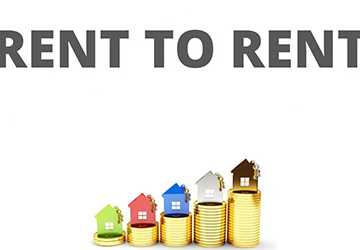Rent-to-own agreements proffer a sui generis avenue to homeownership that can be advantageous for a heterogeneity of individuals. This exposition delves into who should consider rent-to-own agreements, elucidating the pros and cons of rent-to-own homes and understanding rent-to-own real estate deals.

A rent-to-own agreement is an arrangement wherein a lessee consents to rent a domicile for a stipulated tenure, with the prerogative to procure the property ante the lease's cessation. This scheme is advantageous for both lessees and proprietors.
Understanding rent-to-own real estate deals is imperative before entering into such an agreement. These arrangements typically encompass a lease contract amalgamated with a purchase option. The lessee remits rent along with a rent premium, a fraction of which may be allocated towards the property's down payment.
- Lease Agreement: Articulates the duration and conditions of renting.
- Purchase Option: Bestows the lessee the option to purchase the property.
- Rent Premium: Supplemental rent paid towards the eventual purchase.
Deciphering who should consider rent-to-own agreements can aid prospective lessees in making wise decisions. This option is up-and-coming for individuals in specific circumstances.
For those with suboptimal credit scores, rent-to-own agreements facilitate their credit history while residing in the domicile they intend to acquire.
Neophyte buyers still need to be poised to purchase a home outright and can benefit from this arrangement. It allows them to amass savings for a down payment while securing their future abode.
Renters who want long-term stability but need more time to be ready to buy right away can use a rent-to-own agreement to lock in a residence at contemporary market prices.
Understanding rent-to-own real estate deals can benefit real estate investors, as they offer a steady rental income with the potential for a future sale.
Before deciding, it is crucial to appraise the pros and cons of rent-to-own homes.
- Path to Homeownership: Furnishes a mechanism for renters to transition into homeowners.
- Credit Building: Rent remittances can contribute to enhancing credit scores.
- Locked-In Purchase Price: The purchase price is often prearranged at the inception, shielding against market vicissitudes.
- Non-Refundable Payments: Rent premiums are typically non-refundable if the purchase is not consummated.
- Market Risks: The prearranged purchase price might surpass the market value at the lease's denouement.
- Maintenance Responsibilities: Lessees may bear the onus of maintenance and repairs.
Understanding rent-to-own real estate deals necessitates familiarity with the process and what to anticipate.
Steps Involved:
1. Find a Property: Locate a domicile offering a rent-to-own option.
2. Negotiate Terms: Reach consensus on the lease duration, purchase price, and rent premium.
3. Sign the Agreement: Enter into a formal contract delineating all terms.
4. Lease Period: Rent the property for the agreed period, remitting the regular rent and premium.
5. Exercise the Purchase Option: Decide whether to procure the property before the lease concludes.
When contemplating who should consider rent-to-own agreements, discerning the juridical ramifications is paramount. Rent-to-own contracts are labyrinthine and necessitate perspicacious comprehension.
Key Legal Aspects:
Contractual Obligations: Lessees must carefully adhere to the stipulations delineated in the contract, which include payment schedules and maintenance responsibilities.

- Option Fees: An upfront pecuniary fee is frequently required to secure the purchase option. This fee is customarily non-refundable if the purchase option remains unexercised.
Disclosure Requirements: Sellers must fully disclose property-related encumbrances, ensuring lessees are thoroughly apprised before committing.
Exploring the pros and cons of rent-to-own homes necessitates an astute understanding of the financial implications.
- Equity Accumulation: A segment of the rent disbursements may be credited towards the purchase price, fostering equity accretion over time.
- Predictable Costs: Rent-to-own agreements often immobilize the future purchase price, bestowing financial predictability and stability.
Forfeiture of Payments: All accumulated rent premiums are typically forfeited if the lessee abstains from exercising the purchase option.
- Price Fluctuations: The agreed purchase price might prove harmful if the property market value property's market value depreciates.
Understanding rent-to-own real estate deals entails staying abreast of market vicissitudes.
Current Market Conditions:
Housing Market Volatility: Rent-to-own agreements can buffer against precipitous price augmentations in a mercurial housing market.
Interest Rate Changes: Interest rate Oscillations can impact the desirability of rent-to-own agreements, affecting lessees and vendors.
When contemplating who should consider rent-to-own agreements, the capacity to tailor the deal to individual exigencies is significant.
Customizable Terms:
- Flexible Lease Duration: Terms can be modulated to accommodate the lessee's financial preparedness and market conditions.
- Negotiable Purchase Price: While often static, the purchase price can occasionally be renegotiated contingent upon market shifts or property enhancements.
A comprehensive analysis of the pros and cons of rent-to-own homes necessitates juxtaposing them with traditional mortgage financing.
- Lower Immediate Financial Outlay: Rent-to-own agreements typically require less initial capital than traditional mortgages.
Easier Qualification: Individuals with subpar credit may find it easier to qualify for a rent-to-own agreement than a traditional mortgage.
- Higher Long-Term Cost: Cumulatively, the total expenditure of a rent-to-own agreement may surpass that of a traditional mortgage.
- Potential for Non-Purchase: There exists an inherent risk that the lessee will abstain from exercising the purchase option, resulting in a forfeiture of premiums paid.
Deliberating who should consider rent-to-own agreements includes devising potential exit strategies.
Subletting Options: Certain agreements may permit the lessee to sublet the property if they do not exercise the purchase option.
- Buyout Clauses: Specific contracts might encompass clauses that allow the lessee to terminate the agreement prematurely, typically with a financial penalty.
- Refinancing: Lessees may refinance their mortgage to secure more favourable terms after purchasing the property.
Resale Potential: Should the market value appreciate, the new homeowner may profit from selling the property at a profit.
Who should consider rent-to-own agreements? This alternative is ideal for those transitioning from renting to owning, especially individuals with poor credit, neophyte homebuyers, and lessees seeking stability. Potential buyers can make enlightened decisions that best suit their fiscal and personal desiderata by weighing the pros and cons of rent-to-own homes and understanding rent-to-own real estate deals.